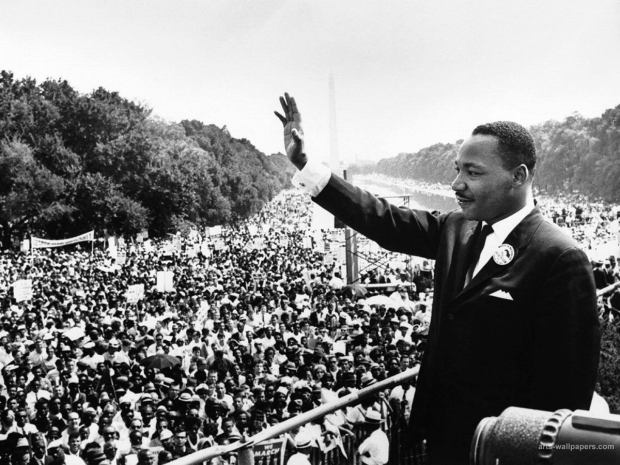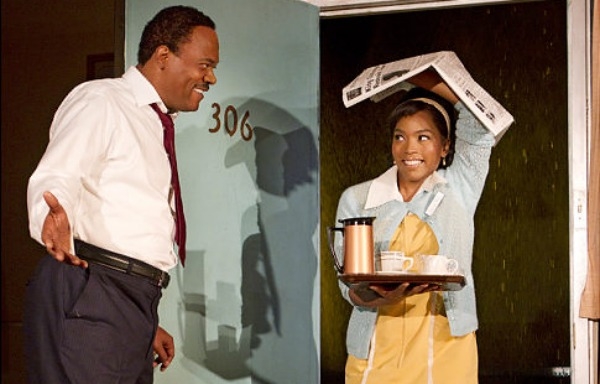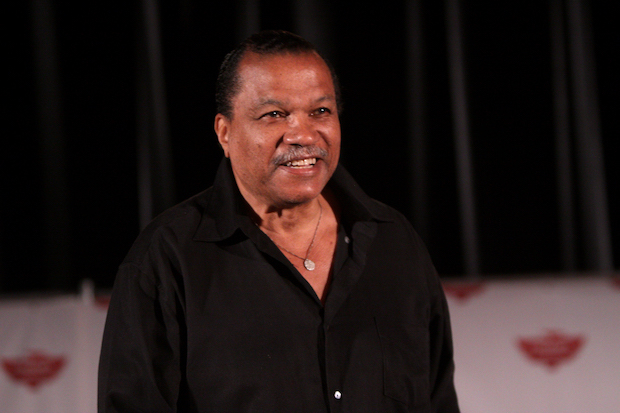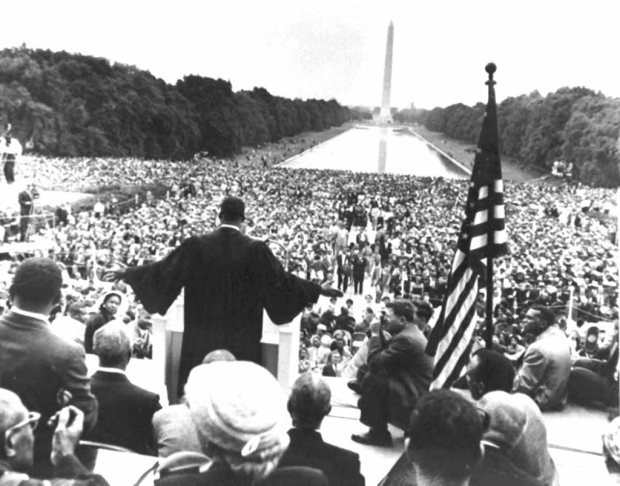Martin Luther King Jr.'s Legacy Has Endured Onstage for Decades
In 1976, Billy Dee Williams embodied Dr. King on Broadway.

(© Wes Candela)
For a figure as important, influential, and eloquent as the Reverend Dr. Martin Luther King Jr., it should come as no surprise that he has been memorialized many times over the years onstage. Most recently on Broadway, he was seen in both of Robert Schenkkan's docudramas about Lyndon Johnson's presidency, All the Way (2014) and The Great Society (2019), and in Katori Hall's imagining of Dr. King's last night in The Mountaintop (2011).
But long before he was interpreted in the words of other artists, Dr. King could be found onstage in an evening composed almost entirely of his own words, less than a decade after he was assassinated. In I Have a Dream, which played in Washington, DC, Atlanta, Chicago, and Philadelphia before reaching Broadway in 1976, Billy Dee Williams played Dr. King in a production constructed from his speeches and sermons, interspersed with musical interludes by a small ensemble. The show was conceived and directed by Robert Greenwald and adapted by Josh Greenfeld.

(© Joan Marcus)
Taking on such an iconic character only eight years after his death was surely a daunting challenge, but I Have a Dream had the support of Dr. King's widow, Coretta Scott King. During an early preview of the show at Ford's Theatre, she took to the stage during the curtain call and led the audience in singing "We Shall Overcome." The Associated Press reported that Mrs. King planned to see the production again with her family when it played Atlanta following the Washington engagement. At Ford's Theatre, she sat with US Representative Andrew Young.
While Williams was still a few years away from his galactic adventures as Lando Calrissian in The Empire Strikes Back, he was already a major star, following his roles in Brian's Song, Lady Sings the Blues, and Mahagony, among others, declared to be "the Black Clark Gable" by the mid-1970s. The pre-Broadway tour overlapped with the release of the film The Bingo Long Traveling All-Stars & Motor Kings, in which he played the title role alongside James Earl Jones and Richard Pryor.
Speaking to the Associated Press in 1976, Williams talked about his preparation of watching films of Dr. King, until it became too much for him. "As I read his words," said Williams, "I invited him to enter my mind and body so I could understand in the most intimate way how he lived and dreamed. Suddenly I felt the strangest sensation, as though some outside force were taking charge of me. It was frightening, and I quickly shook it off." He went on to say, "Finally I stopped looking at the films because I didn't want to be intimidated by them. I had to reach the characterization in an honest, natural way. I had to fall into my own interpretation of Martin Luther King, not merely an imitation."

(© Gage Skidmore)
A United Press International review said of the show, "This is a must-see production for those who took part in the civil rights movement and marches; tears abound among the spectators reliving the experience of the late '50s and '60s." The Associated Press review by William Glover concluded with, "The events being recalled are vivid part of every spectator's past. That, with Mr. Williams' skilled and infinitely detailed performance are the theatrical essence of ‘I Have a Dream.'"
The New York Times wrote, "It is an evening for memory, recognition and gratitude. It could have been better put together—but the time for a genuine play on Martin Luther King is not yet. We are too close to the events, and the real actors are still alive in the newsreels of our memories."
I Have a Dream played a total of eight previews and 88 performances on Broadway, with Moses Gunn succeeding Williams late in the run. It was filmed for television, during its Philadelphia run, but Greenwald has said he does not believe it was ever broadcast or released.
Some (but hardly all) of the other plays that would portray Dr. King in subsequent years, as both a leading and supporting character, include The Man in Room 306 by Craig Allen Edwards, Smoldering Fires by Kermit Frazier, Appomattox by Christopher Hampton, The Great Society by Alexander Harrington, The Conscientious Objector by Michael Murphy, I Am a Man by OyamO, The Meeting by Jeff Stetson, and Blueprints to Freedom: An Ode to Bayard Rustin by Michael Benjamin Washington. Dr. King was also portrayed in Richard Allen and Taran Gray's Freedom Riders: The Civil Rights Musical.

(© Combined Military Service Digital Photographic Files)
That last production was not the first time the character of Dr. King has appeared in a musical, but an early effort proved very troubled, to say the least. In 1990, King: A Musical Testimony, employed a series of creative talents on its way to a short run in London's West End. The British composer was Richard Blackford, while at various times Ron Milner and Richard Nelson were bookwriters, with Lonne Elder III receiving the final credit. The succession of directors began with Gotz Friedrich, then Graham Vick, and it opened under the direction Clarke Peters, a member of the show's cast of more than three dozen actors; John Caird was an adviser throughout the musical's development.
King's lyrics were by Maya Angelou; however, Angelou's dissatisfaction with the project led her to speak out against it, saying, "None of the power of King's personality or faith comes across. It makes him look a small man, not very great and not even very bright." Angelou would be succeeded by Alistair Beaton. Coretta withdrew her support as well, and the King estate let it be known publicly that it was considering legal action against the show, though Mrs. King's endorsement was subsequently reinstated before the show's opening. The production ran less than two months, including previews.
His presence onstage is only a small part of Martin Luther King's legacy. But with the majority of the examples above coming in the last 20 years, it would seem that as we gain ever more perspective, he proves ever more fascinating. May Dr. King's legacy be celebrated on our stages for years to come.








